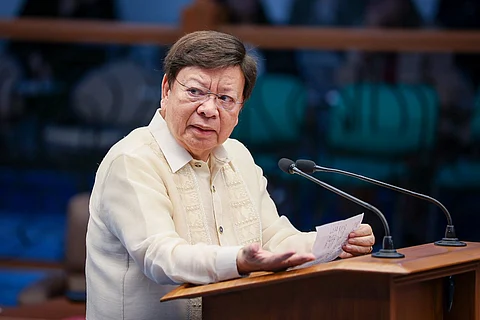
- NEWS
- the EDIT
- COMMENTARY
- BUSINESS
- LIFE
- SHOW
- ACTION
- GLOBAL GOALS
- SNAPS
- DYARYO TIRADA
- MORE

Senate Deputy Majority Leader Rodante D. Marcoleta on Monday called on Congress to exercise its oversight powers more vigorously to address the worsening plight of Filipino farmers and help revive the country's struggling agriculture sector.
During his interpellation of the privilege speech delivered by Senator Raffy Tulfo, Marcoleta—a lawyer and son of a farmer from Paniqui, Tarlac—highlighted the government’s failure to implement several progressive agricultural laws already in place.
“Mayroon po tayong batas…na doon ay nagkaroon ng mandato na bigyan natin ng ‘guaranteed price’ ang palay (We have a law… which mandates that we provide a ‘guaranteed price’ for palay (unmilled rice),” Marcoleta said.
One of these is a measure mandating a guaranteed price for palay (unmilled rice), which, according to Marcoleta, has yet to materialize.
“Let us revisit that,” he added.
He cited recent complaints from farmers in Tarlac and Pampanga, who are reeling from the low buying prices of palay, now reportedly selling for as low as P7-8 per kilo for fresh harvest, and P11-12 per kilo for dried palay.
“Halos umiiyak sila (They almost crying),” he said, as he decried how cheap, imported rice continues to flood local markets under Republic Act 11203 or the Rice Tariffication Law, squeezing local farmers out of business.
He also flagged the non-implementation of a law mandating the local manufacture of farm machinery and equipment, saying the country continues to import instead of supporting domestic production.
Another critical law, the Agriculture and Fisheries Modernization Act (RA 8435), which aims to protect and preserve agricultural lands from conversion, has also been widely disregarded, he added.
“Mayroon din po tayong batas na nagsabi, kung hindi po ako nagkakamali, dito sa Fisheries and Agriculture Modernization Act, kung saan po dedicated po yung mga lupa na kailangan pagtaniman,” he related. [Note: RA 8435]
This law mandates that agricultural lands cannot be easily converted or reclassified.
“Ngayon ang reclassification, conversion ng mga lupa, kaliwa’t kanan na po ang nangyayari. Isang araw po gigising tayo, baka wala na po tayong mapagtamnan. Kahit kangkong na lang (Now, reclassification and conversion of agricultural lands are happening left and right. One day, we may wake up with no land left to farm—not even for kangkong (water spinach),” he warned.
Marcoleta likewise raised the issue of the Agri-Agra Reform Credit Act of 2009 (RA 10000), which requires banks to allocate 25% of their loanable funds for agricultural and agrarian reform beneficiaries. He lamented that financial institutions have found loopholes to circumvent this requirement.
“Gumawa po sila ng paraan para maiwasan ito. Ibinigay sa mga mangungutang na kunwari related sa agriculture. Doon po napunta, kaya napakaraming warehouse po na nangyari (They lent to borrowers who only appeared to be connected to agriculture. That’s how it ended up funding warehouse constructions instead of real farmers),” he explained.
To ensure sustained government focus on agriculture, Marcoleta proposed creating a permanent commission on agriculture, similar to EDCOM 2 for education.
This body, he added, could monitor the country's rice self-sufficiency efforts, the role of the National Food Authority (NFA), and address problems like rice hoarding, smuggling, and unregulated importation.
